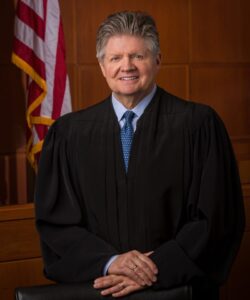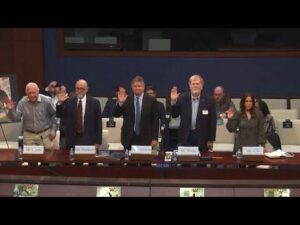‘Secret Service Was Very Difficult’
Judge John Tunheim
Opening statement to the House Task Force on the Declassification of Federal Secrets, Committee on Oversight and Government Reform, U.S. House of Representatives
20 May, 2025
Congresswoman Luna: I now recognize Judge Tunheim for an opening statement.
JUDGE TUNHEIM: Thank you, Madam Chair. Thank you, Mr. Ranking Member. I appreciate this opportunity to speak today. My name is John Tunheim. I’m a federal district court judge for the District of Minnesota. I’m in my 30th year as a federal judge. I served as chief judge of our district from 2015 until 2022 and as a member of the U. S. Judicial Conference from 2020 to 2024. I was originally nominated by President Clinton in 1995 after serving 10 years as Minnesota’s chief deputy attorney general. I was chair of the Assassination Records Review Board during its entire existence from 1994 through 1998. The review board was an independent federal agency. Its five board members were confirmed by the US Senate after being nominated by President Clinton.
Congress created the review board for the express purpose of reviewing all of the still secret records of the tragic assassination of President John Kennedy and declassifying as much information as could be publicly released. The impetus for the law, which was enacted in October 1992, was Oliver Stone’s movie, JFK. The President John F. Kennedy assassination records collection act of 1992 provided for a five-member decision-making board which would make decisions on agency-requested redactions from classified documents we had declassification authority the first time and maybe the only time an outside group had that authority. The board members were by law to be recommended for appointment by professional organizations: two National Historical Associations, an Archivist’s Association, and the American Bar Association. Besides me, the members included a renowned provost from a major university, later university president, two distinguished history professors, and a senior archivist at Princeton.
We were confirmed in 1994 and began our work with no appropriation or offices. We worked out of the National Archives for a time until I was able to secure some funding from the White House to get us started before Congress could provide an appropriation. The agency’s presentation of records was seriously delayed because of the delay in the appointments. We were ready to begin review with our staff by early 1995. The statute did not require us to reach any conclusions about prior investigations or what happened on November 22nd. Rather, our task was to conduct a wide-ranging search for records to create the largest possible collection. Of assassination-related records as open to the public as possible. The goal was to allow the interested public to make up their own minds about what happened and based on an open and transparent and complete record.
The congressional mandate, and this is important, it stated that the records relating to the assassination would, quote, carry a presumption of immediate disclosure. Quote, only in the rarest of cases is there any legitimate need for continued protection. This is Congress in 1992. Congress defined the term ‘assassination records’ broadly and indicated that the review board could further define the term assassination record, which we did. So in June of 1995, our definition was that any record that was reasonably related to the assassination would be an assassination record subject to the board’s jurisdiction. And we included all records collected by government agencies in conjunction with any investigation or analysis of or inquiry into the assassination of President Kennedy. We developed detailed guidelines for agencies to follow, and agencies did have the right to appeal our decisions directly to the President.
We were authorized to redact words. We did not ever redact entire documents that the agency proved by clear and convincing evidence, that was a standard, that the harm of disclosure outweighed the public interest in the document in four categories, national security, intelligence gathering methods, personal privacy, or methods of protecting the president. That was it. We held many public hearings, experts’ conferences around the country, in addition to our private meetings, to discuss our decision making. We also tried to clarify unclear evidence where we could, digitalizing autopsy materials and analyzing them and deposing the autopsy physicians. We also gathered artifacts, including photographs and film, clothing, and other artifacts. We had limited time to do our work. We had limited time to do our work, which was not enough time.
We were granted just one more year by Congress, so we had a total of three years. We began to lose staff as we approached the end of our mandate. In all, the board issued over 27,000 individual rulings. These were decisions on requests by agencies to protect information. Most redacted information had release dates attached to them. We made it easy for the researchers to determine whether a redacted name appeared in different locations so that they would know it was the same person. There were a further 33,000 consent releases, which essentially means that the agency saw the handwriting on the wall and released the documents directly since we were likely to order release. When we finished, there were nearly 5 million pages at the National Archives.
We made the decision early that we would not protect any information directly related to the assassination because of the high level of public interest. By 2017, when the last records were to be released under the Act, there were probably not more than 1,500 review board redactions that were remaining. The Act was clear in stating that despite the Review Board wrapping up its work in 1998, the Act was to continue in effect, which meant that agencies had the obligation to continue to present information. Most of the redactions now in the documents are within documents never shown to the Review Board but were transferred to NARA at a later time. Agencies largely complied with the mandate to present records to the review board.
However, there are many delays and denials with records that we specifically requested, and there were many skirmishes along the way. It does not take a rocket scientist to realize that agencies were awaiting the end of our three-year mandate. The first 500 or so adverse disclosure decisions we made in FBI records were appealed to the president, and the appeals were dropped when White House counsel, former judge, and Representative Abner Mikva told the FBI to drop the appeals because President Clinton would deny all of them. FBI staff was helpful to us, but I’m now seeing records in the new releases that were not disclosed to the review board. The CIA was cooperative and processed many documents with us, but never, we never receive much of what we specifically asked for example, for documents involving James Angleton that we had not seen, I was told the documents were no longer maintained as a collection.
We received only three memoranda that incorporated the agency’s review of Angleton’s counterintelligence files. Not the files themselves, just a review by someone else of the files. We were told that all the other documents had been destroyed. I’m now seeing a flood of documents that clearly meet the definition of assassination records involving Angleton and others that were not submitted to us for review. When CIA analysts would not tell us the details of their secret operations, our response was, okay, we’ll release the record in 10 days. We then heard the details and could make a reasonable decision. We had in our hands a small file on George Joannides that was disclosed. It disclosed nothing really, so it was returned. We didn’t know the details of his work at the time.
We now know much more about Joannides, and his file should be immediately disclosed. There’s no reason anymore for protecting those files. Clearly, we were misled. I actually wrote to President Biden asking that he order the CIA to release the Ioannidis file, and I never received a response. The Secret Service was very difficult. They were the only agency that we were aware of that tried to reclassify assassination records after we were in office. They attempted to classify documents that had already been released publicly and fought us over 1963 threat sheets. That was still in process when we left office. The Department of State was less than helpful, although they released records in their possession. When we negotiated with Russian officials over the Oswald files in Moscow, they did not lift a finger to help us, not even allowing us access to the United States Embassy.
When we tried to get access to Belarusian records on Oswald, they did not help. When we planned meetings with Mexican and Cuban officials, they stopped us from direct contacts. The Act specifically required the Department of State to help us find foreign records. The National Archives was very helpful to us when we did our work. A very dedicated staff member, Stephen Tilley, was instrumental in getting our work done. But since we left office, I’ve been disappointed the Archives has not devoted more personnel to the records. We had planned that the Archives would continue our work to the extent possible. For the most part, that has not happened, and the agency has never been in contact with me. So, there are other files that should be released.
We came close to an agreement to copy the entire KGB file on Lee Harvey Oswald that is maintained in Minsk, Belarus. Last-minute disputes prevented the agreement from moving forward. Copies of the files are in Moscow.
I just have a little bit more here. We were particularly interested in the files of Walter Sheridan, an investigator for Robert Kennedy. When we took office, he removed the files from the Kennedy Library where we had access to them and gave them to NBC for safekeeping. I don’t think those files have been released. The William Manchester-taped interviews of Jacqueline and Robert Kennedy are protected by a 1967 legal agreement now controlled by Caroline Kennedy. We encouraged her to release the files, and she finally responded in August 1998 that she would not agree to their release or even let us listen to the recordings. And out there somewhere are files on Jack Ruby. We could not find them other than the files maintained by the earlier investigations.
And the final report of the board, a copy of which I will give to Madame Chair today. We made ten recommendations that are relevant today; still, I won’t go through them all, but they deal with the problems of excessive government secrecy, which has plagued the public’s understanding of the Kennedy assassination for decades. We strongly endorsed the method selected for independent declassification of executive branch records that was used in our case, but also detailed the problems inherent in the review board’s legislation.
Most important, to deal with massive over-classification, we recommended a federal classification policy be developed that substantially: one, limits the number of those in government who can actually classify federal documents; two, restricts the number of categories by which documents might be classified; three, reduces the time period for which documents might be classified; four, encourages the use of substitute language to immediately open material that might otherwise be classified; and five, increases the resources available to agencies and NARA for declassifying federal records.
Thank you, Madam Chair.
Congresswoman Luna: Thank you very much. And just so everyone knows, we are going to be following up on getting that file, the KGB file in Minsk. I’m interested in seeing that, and I think that with peace talks right now, it might be prime time for that. So we will be following up on that.
JUDGE TUNHEIM: It stands about five feet high. It’s a lot of records.


